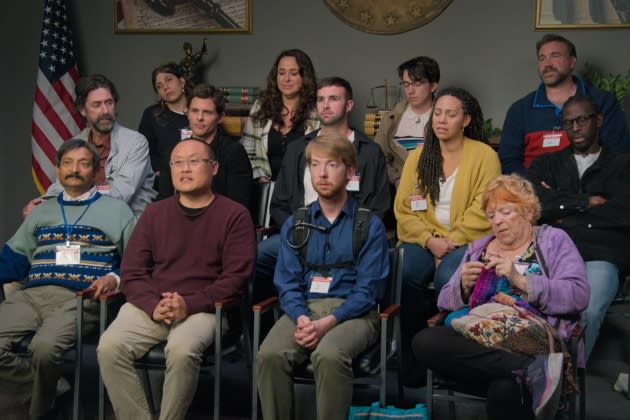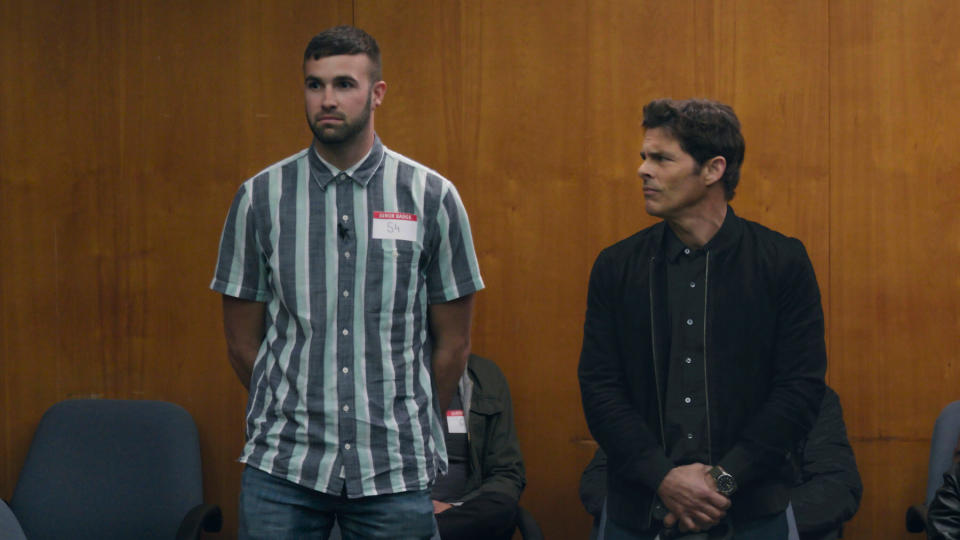‘Jury Duty’ Is a Very Funny TV Hit. It’s Also Terrifying
- Oops!Something went wrong.Please try again later.

Jury Duty, the surprise hit on Amazon Freevee, is a very good and funny show. The premise is high-concept, the episodes tightly written and edited. The casting is impeccable, including that of James Marsden as a heightened, more narcissistic version of himself, providing a fitting venue for his staggering comedic talents. And some of the gags, including one with a botched animation of a court re-creation, made me laugh harder than I have ever laughed in my life.
Yet Jury Duty also made me ask questions about the trajectory of our culture that I wish I did not have to ask. Though it purports to shine a light on the positive aspects of humanity, in some ways it exemplifies a decidedly negative one: our glee at seeing hapless people placed in situations they cannot control.
More from Rolling Stone
Amazon 'Pet Day' Arrives: Here Are The Best Deals to Shop Now, From Pet Cameras to Tech-y Toys
'The Gentle Art of Swedish Death Cleaning' Is Your New Reality-TV Addiction
'The Citadel' On Prime Video: How to Watch the Russo Brothers-Produced Spy Thriller Online
The premise of Jury Duty is basically as follows: A group of actors is tasked to stage a jury trial without piquing the suspicions of the one non-actor, Ronald Gladden, a hunky project manager from San Diego, a.k.a. Juror No. 6, who believes that he has signed up for an obscure PBS-style documentary about the American justice system. It becomes apparently fairly quickly to Gladden that this is not your ordinary trial: The case is inane, the fellow jurors written in broad strokes almost like the cast of a workplace comedy (it’s created by former writers of NBC’s The Office Lee Eisenberg and Gene Stupnitsky, so a man-eating millennial who wears a potato-chip bag claw as a hair clip is the Meredith, while a nerdy aspiring inventor who shows up in “chair pants,” or “chants,” the Dwight), and the jury is sequestered after Marsden, who is selected as an alternate, calls the paparazzi on himself in an effort to get out of service. Hijinks ensue, including a jaunt to Margaritaville, the discovery of an elaborate cover-up leading to a 12 Angry Men-style showdown, and the deflowering of a juror by way of “soaking” (depending on your threshold for weirdness, looking it up on Urban Dictionary will either ruin, or make, your day).
Though Jury Duty ultimately has higher aspirations, it is at its heart a prank show, in the vein of Nathan for You or Borat (indeed, producer Nicholas Hatton worked with Sacha Baron Cohen on the latter film). With these types of shows, there are a few approaches: There’s the idea that only assholes want to be on TV, so placing them in front of a camera and letting them humiliate themselves, albeit under false or misleading pretenses, allows them to show their true colors. Another subgenre involves engineering elaborate scenarios to highlight people at their most vulnerable (e.g., Punk’d), often without obtaining their prior consent to appear on camera.
Jury Duty does both and neither of these things. Even though Ronald Gladden has consented to be on TV, thus implying that he must, to at least some degree, want the exposure that comes with being on-camera, the show operates from the assumption from the very beginning that he is not an asshole; actually, he comes pretty close to being a real-life saint. Jury Duty doesn’t place him in situations designed to show him at his worst; rather, it reverse-engineers situations where it can show him at his best, assigning him jury foreperson and making him the moral center of the group.
“We wanted to give Ronald a little hero’s journey where he becomes the leader of this pack of eccentric weirdos, and he kind of is the glue that holds them together,” showrunner Cody Heller explained in a recent Zoom interview. “My main thing was, I never wanted it to feel like we’re making fun of this guy or that we’re punching down. I don’t want to humiliate him or embarrass him.” Call it the Ted Lasso of prank shows.
Much of the humor stems from the incredible lengths the production team and cast go to to keep up the illusion for Ronald (in one scene in which Ronald takes the fall for Marsden clogging the toilet, Marsden actually used poop-scented spray to make the effect more convincing, Heller told me). But the most impressive thing about Jury Duty is its casting of Ronald, a guy who has an almost preternatural level of patience and faith in humanity. Throughout the trial, he proves to have a staggering tolerance for uncomfortable or frustrating situations, gently trying to talk down a juror’s outraged ex-girlfriend, or talking some sense into a recently divorced juror holding out on a vote because he doesn’t want to go back to an empty house. Heller said that Ronald was cast out of nearly 2,500 applications for the role, and it’s easy to see why. He’s unfailingly decent, polite, and unquestioning: perfect for the role of unwitting hero, yes, but also the perfect mark.
Ronald spends three weeks sequestered in the hotel — three weeks where literally everyone he is interacting with is lying to him — and there are a few moments in Jury Duty where we gradually become aware of the possible implications of someone’s sense of reality getting fucked with in real time. When the deceptions are low stakes, it works in Jury Duty’s favor; one of the funniest moments of the show is when the other jurors share their deeply poignant memories of a recently ejected juror, prompting Ronald to express his incredulity, as the only interaction he had with the juror was when he said he was going to go to the bathroom to masturbate. But the mindfucks increasingly get less humorous as the show progresses. Heller tells me that in the sixth episode, where Marsden mistakenly believes that he is being thrown a consolation surprise party after losing out on a role and angrily flips a birthday cake, that Ronald got so upset with Marsden that the producers told him to bring back a second cake and apologize. For the audience, watching a narcissistic actor go HAM on a birthday cake is funny, but it’s easy to see how, from Ronald’s perspective, watching a guy who has already shown himself to have poor judgment and narcissistic tendencies behaving in a violent manner might be genuinely terrifying.

I asked Heller if any of the cast or crew members, at any point, had any reservations about continuing to snooker Ronald into believing the trial was real. “Ethically, honestly, there were many moments where, because we love Ronald so much, we felt bad we were deceiving him,” she said, before backpedaling: “But we always said we’re never gonna put him in a bad light. This was always about celebrating his humanity and his kindness.”
Jury Duty does celebrate Ronald’s kindness, which differentiates it from more inherently mean-spirited prank shows, but it also undoubtedly takes advantage of it. The show takes pains to show the deep bonds Ronald makes with everyone on the jury, enmeshing him in their divorces and crises of confidence and weird sexual initiations, before pulling the rug out from underneath him and revealing all of these relationships to be based on lies. Ronald appears to handle the revelation with grace, and Heller says Ronald and his castmates are all still best friends. She says the show also employed a therapist to do weekly check-ins with Ronald to ensure he would not be traumatized after the curtain was finally pulled. But she also said it took Ronald a lot of time afterward to fully “digest” that the entire thing was staged, with him asking what was real and what was not for hours.
Ronald does not seem to have suffered much for the experience, and he has been making the rounds promoting the show and enjoying his newfound sex-symbol status on social media. But I do wonder whether a contestant who had not been so carefully chosen for their lack of apparent ego or guile would have had as easy a time processing a deception on that level, even if it was for the purpose of showcasing the best sides of their humanity. I also wonder whether the success of Jury Duty bodes well for the trend of turning unwitting Average Joes into main characters in the news cycle, as demonstrated by the phenomenon of TikTokers turning even the most quotidian of their daily interactions with unwitting strangers into viral gold. Many of these encounters that go viral — with mall Karens, say, or road-rage Chads — show humanity at their worst, and the resulting internet rage over their actions can be read as welcome comeuppance for their actions. But there are also instances where someone goes viral for positive reasons, and is either unequipped to deal with the attention or is quickly deprived of their hero status when they are revealed to have a history of bad tweets or sleazy DMs or an unwashed DUI mugshot, a phenomenon known as being “Milkshake Duck’d.”
I have no idea whether Ronald will be Milkshake Duck’d. (I asked Heller if he was secretly MAGA or something, and she demurred: “Obviously, no one’s an angel. Everyone has flaws. But I really think he is just a positive guy who doesn’t want to get involved in anything dramatic or bad.”) But I do know that not everyone wants to be a hero, particularly if it’s in a story they never agreed they wanted to be in in the first place. Not everyone would respond so well to being the butt of a joke, even if the joke is a relatively gentle one. Jury Duty is a very clever and funny show, but despite its stated aims, I’m not sure it’s a particularly kind one.
Best of Rolling Stone

